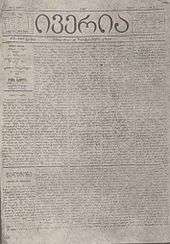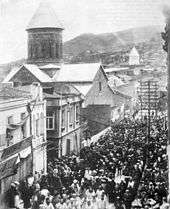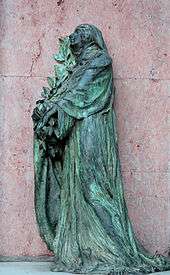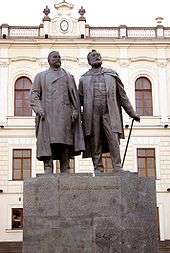Ilia Chavchavadze
| Prince Ilia Chavchavadze | |
|---|---|
|
Ilia Chavchavadze by Alexander Roinashvili (digitally colorized illustration) | |
| Born |
8 November 1837 Kvareli, Tiflis Governorate, Russian Empire (present-day Kakheti, Georgia) |
| Died |
12 September 1907 (aged 69) Tsitsamuri, outside Mtskheta |
| Resting place | Mtatsminda Pantheon, Tbilisi |
| Occupation | jurist, poet, novelist, humanist, publisher, philosopher |
| Nationality | Georgian |
| Literary movement | Realism, Historical fiction |
|
| |
| Signature |
 |
Prince Ilia Chavchavadze (Georgian: ილია ჭავჭავაძე; 8 November 1837 — 12 September 1907) was a Georgian writer, political figure, poet, and publisher who spearheaded the revival of the Georgian national movement in the second half of the 19th century, during the Russian rule of Georgia. He is Georgia's "most universally revered hero."[1]
Inspired by the contemporary liberal movements in Europe, as a writer and a public figure, Chavchavadze directed much of his efforts toward awakening national ideals in Georgians and to the creation of a stable society in his homeland. His most important literary works were: The Hermit, The Ghost, Otaraant Widow, Kako The Robber, Happy Nation, Latters of a Traveller and Is a man a human?!. He was editor-in-chief of the periodicals Sakartvelos Moambe (1863–77) and Iveria (1877–1905), and authored numerous articles for journals. He was a devoted protector of the Georgian language and culture from Russification. He is considered the main contributor of Georgian cultural nationalism.[2][3] The three main ethnic markers of Georgian identity, according to Chavchavadze, consisted of territory, language, and Christianity.[4] Despite this, his nationalism was secular.[5]
Chavchavadze was fatally wounded in Tsitsamuri, outside Mtskheta, by a gang of assassins. His legacy earned him the broad admiration of the Georgian people. In 1987 he was canonized as Saint Ilia the Righteous (წმინდა ილია მართალი, tsminda ilia martali) by the Georgian Orthodox Church. Today, Georgians revere Chavchavadze as The Uncrowned King (უგვირგვინო მეფე, ugvirgvino mepe) and the "Father of Nation."[6]
Life
Ancestry and early life
Ilia Chavchavadze was born in Qvareli, a village in Kvareli,[7] located in the Alazani Valley, in the Kakheti province of Georgia, which was part of the Russian Empire at that time. Ilia was a tavadi, the Georgian title of prince. It is thought that the noble Chavchavadze family came from the Pshav-Khevsureti region of Georgia, and, in 1726, King Constantine II granted the Chavchavadze family the rank of Prince in recognition of their knighthood and valor to the nation. This resulted in the family moving and settling in the Alazani Gorge in Kakheti. According to King Erekle II's order, Ilia's great grandfather, Bespaz Chavchavadze was knighted when he defeated twenty thousand Persian invaders in Kvareli in 1755.
Ilia was the third son of Grigol Chavchavadze and Mariam Beburishvili. Grigol, like his father and his famous ancestors, had a military background. He, along with the local militiamen protected the village from numerous Dagestani invasions. This can be seen in the architecture of the Ilia Chavchavadze museum house in Kvareli, incorporating a Medieval castle style in the two-storey castle in the yard, which was designed to protect the house during invasions.
Chavchavadze was educated at the elementary level by the deacon of the village before he moved to Tbilisi where he attended the prestigious Academy for Nobility in 1848. However, from an early age, Ilia was influenced by his parents who were highly educated in classical literature, Georgian history and poetry. From his parents, Ilia learned the inspiring stories of Georgian heroism in classical historical novels. In his autobiography, Ilia refers to his mother, Princess Mariam Chavchavadze, who knew most Georgian novels and poems by heart and encouraged her children to study them. Ilia also described the influence of the deacon's storytelling, which gave him an artistic inspiration, later applied in his novel writing.
Ilia's mother, Mariam, died on 4 May 1848, when Ilia was ten years old, and his father asked his sister, Makrine, to help bring up the children. Aunt Makrine had a significant impact on Ilia's life, because, after 1852, when Ilia's father Grigol died, she was the only remaining caretaker of the family.[7]
In 1848, after the death of Princess Chavchavadze, Ilia was sent to Tbilisi by his father to begin his secondary education.[7] Ilia attended a private school for three years before he entered the 1st Academy of Tbilisi in 1851. Soon after, Ilia's father died and Aunt Makrine looked after the family. His secondary school years were very stressful, due to his father's death. However, the Chavchavadze family suffered another devastating blow when Ilia's brother, Constantine, was killed during the Dagestani raid on Kakheti. Ilia expressed his anguish and grief in one of his first short-poems called Sorrow of a Poor Man. In addition to his personal problems, the political situation in Georgia worsened under the harsh authority of the Russian Empire, which played a destructive role to the nation and its culture.
Student years
After graduating from the academy, Ilia decided to continue his education at the University of St. Petersburg, Russia. Before leaving for St. Petersburg, Ilia composed one of his most remarkable poems, To the Mountains of Kvareli in the village of Kardanakhi on 15 April 1857, where he expressed his lifelong admiration for the Greater Caucasus Mountains and his sorrow at leaving his homeland.
That same year, Ilia was admitted to the University of St. Petersburg. During his student years, numerous revolutions sprang up in Europe which Ilia observed with great interest. Ilia's attention focused on the events in Italy and the struggle of Giuseppe Garibaldi, whom he admired for many years. While in St.Petersburg, Ilia met Princess Catherine Chavchavadze, from whom he learned about the poetry and lyrics of the Georgian romantic Prince Nik'oloz Baratashvili. Due to the harsh climate in St Petersburg, Ilia became very ill and returned to Georgia for several months in 1859.
Ilia finally returned to Georgia after the completion of his studies in 1861. During his journey back, Ilia wrote one of his greatest masterpieces, The Travelers' Diaries, where he outlines the importance of nation-building and provides an allegorical comparison of Mt. Kazbegi and the Tergi River in the Khevi region of Georgia.
Political life


Ilia's main political and social goals were based on Georgian patriotism. He radically advocated the revival of the use of the Georgian language, the cultivation of Georgian literature, the revival of autocephalous status for the Georgian national church, and, finally, the revival of Georgian statehood, which had ended when the country became part of the Russian Empire. As the number of supporters for his ideas grew, so did opposition among the leading Social Democrats like the Menshevik Noe Zhordania; their main aims were focused on battling the Tsarist autocracy and a democratic transformation of the Russian empire. This did not include the revival of a Georgian state or of a Georgian self-identity. Ilia was viewed as bourgeois and as an old aristocrat who failed to realize the importance of the revolutionary tide.
In addition to his works described above, he was also the founder and chairman of many public, cultural and educational organizations (Society for the Spreading of Literacy Among Georgians, "The Bank of the Nobility", "The Dramatic Society", "The Historical-Ethnographical Society of Georgia", etc.). He was also a translator of British literature. His main literary works were translated and published in French, English, German, Polish, Ukrainian, Belarusian, Russian and other languages. Between 1906 and 1907, he was a member of the State Council (Gosudarstvennaya Duma) in Russia. His eclectic interests also led him to be a member of, among others, the Caucasian Committee of the Geographical Society of Russia, the Society of Ethnography and Anthropology of Moscow University, the Society of Orientalists of Russia and the Anglo-Russian Literary Society (London).
Prince Chavchavadze briefly acted as a literary mentor to a young Joseph Stalin, who was then an Orthodox seminarian in Tbilisi. According to historian Simon Sebag Montefiore,
"The Prince was sufficiently impressed to show the teenagers work to his editors. He admired Stalin's verse, choosing five poems to publish – quite an achievement. Prince Chavchavadze called Stalin the, 'young man with the burning eyes.'"[8]
Death

After serving as a member of the Upper House in the first Russian Duma, Ilia decided to return to Georgia in 1907. On 28 August 1907 Ilia Chavchavadze was murdered by a gang of six assassins who ambushed him and his wife Olga while traveling from Tbilisi to Saguramo, near Mtskheta.
The prince's murder was seen as a national tragedy which was mourned by all strata of Georgian society. Prince Akaki Tsereteli, who was suffering from serious health problems at the time, spoke at the funeral and dedicated an outstanding oration to Ilia: "Ilia's inestimable contribution to the revival of the Georgian nation is an example for future generations".[9]
Theories
The assassination of Ilia Chavchavadze remains controversial today. The "widely held suspicion"[10] in his murder laid on the Bolsheviks from the Russian Social Democratic Labour Party.[11][12][13] Chavchavadze publicly undermined the program of the Social Democrats.[12] Furthermore, his socially conservative vision for Georgian nationalism and his tremendous popularity among the public may have been the causes. Historian Simon Sebag Montefiore suspects that Joseph Stalin may have been involved in planning the his murder. According to Montefiore,[14]
| “ | The Bolshevik position in Georgia was undermined by the assassination of the hugely popular Prince Ilya Chavchavadze, in August 1907. The Bolsheviks had attacked his patriarchal vision of Georgian culture and, it was widely believed, had decided to kill him. There is some evidence that Stalin's friend Sergo Ordzhonikidze organized or took part in the assassination. It may be that the SDs took no part in the murder at all. Stalin always praised Chavchavadze's poetry in his old age and there is no evidence that he ordered the hit, but he was very close to Sergo and he was certainly more than capable of separating literary merit from cruel necessity: politics always came first. | ” |
Legacy

As a result of Chavchavadze's death, the Georgian Social Democrats, especially the Mensheviks, started to gain significant power and support among the population. Eventually, after the temporary disengagement of Russia from Transcaucasia, Georgian Mensheviks decided to revive Georgian statehood and proclaimed the independence on 26 May 1918. After the Bolshevik occupation of Georgia and integration into the Soviet Union in 1921, Chavchavadze became for Georgian nationalists the symbol of Georgian freedom and national liberation.
In 1987, Prince Chavchavadze was formally canonized by the Georgian Orthodox and Apostolic Church, as "Saint Ilia the Righteous."[7]
In 1989, during the anti-Soviet protests in Tbilisi, the poems, novels and political life of Chavchavadze became a driving force behind the Georgian struggle for independence.
The idea of national revival, which Chavchavadze preached and advocated in various Georgian societies throughout his life, gained in momentum in 1990. In 2002, Mikheil Saakashvili created the United National Movement party which claimed the political legacy of Ilia Chavchavadze's party, and which played a major role in the so-called Rose Revolution of 2003 which ousted President Eduard Shevardnadze.
In 1998 Stephen Kinzer wrote about the widespread admiration of Chavchavadze across political spectrum: "Today leftists in Georgia embrace Chavchavadze for his hatred of injustice, centrists love him for his nonviolent humanism, and right-wing nationalists have adopted his slogan Homeland, Language, Religion."[1]
Publications of Chavchavadze's works
- Georgische Dichter. Translated and compiled by Arthur Leist, Dresden-Leipzig, 1887 (Poems of Ilia Chavchavadze and other Georgian poets, in German)
- The Hermit by Prince Ilia Chavchavadze. Translated from the Georgian by Marjory Wardrop, London, 1895
See also
References
- 1 2 Kinzer, Stephen (7 May 1998). "Saguramo Journal; On the Tallest Pedestal, a Man for All Georgians". The New York Times.
- ↑ Chkhartishvili 2013, p. 192: "The main designer and contributor to the Georgian nationalist project was the eminent Georgian writer and public worker Ilia Chachcavadze (1837-1907)."
- ↑ Chkhartishvili 2013, p. 195: "In 1860-1880ss the premature Georgian political nationalism was replaced by fully developed Georgian cultural nationalism. As it was already mentioned, its main author was Ilia Chavchavadze who, with his co-workers, was an active part of the societal life of the 1860s."
- ↑ Chkhartishvili 2013, p. 198.
- ↑ Chkhartishvili 2013, p. 199.
- ↑ Kekelia, Tatia (2015). "Building Georgian national identity". In Agadjanian, Alexander; Jödicke, Ansgar; van der Zweerde, Evert. Religion, Nation and Democracy in the South Caucasus. Routledge. p. 123.
- 1 2 3 4 "Martyr Ilia Chavchavadze of Georgia". Orthodox Church in America.
- ↑ Simon Sebag Montefiore, "Young Stalin," page 57.
- ↑ David Marshal Lang, History of Modern Georgia, p. 176.
- ↑ Jones, Stephen F. (2005). Socialism in Georgian Colors: The European Road to Social Democracy, 1883-1917. Harvard University Press. p. 221. ISBN 9780674019027.
Bolshevik unpopularity in Georgia was in part due to the widely held suspicion that they had been behind the murder of Ilia Chavchavadze in August 1907.
- ↑ Conquest, Robert (1991). Stalin: breaker of nations. Viking. p. 42. ISBN 9780670840892.
...the Bolsheviks were suspects in the (still obscure) murder of Prince Chavchavadze, father of the Georgian cultural renaissance, on 28 August 1907: he had spoken out strongly against the revolutionary left.
- 1 2 Geifman, Anna (1995). Thou Shalt Kill: Revolutionary Terrorism in Russia, 1894-1917. Princeton University Press. pp. 95-96. ISBN 9780691025490.
- ↑ Radu, Michael (2006). Dilemmas of Democracy and Dictatorship: Place, Time and Ideology in Global Perspective. Transaction Publishers. p. 42. ISBN 9781412821711.
...Ilia Chavchavadze, murdered by the Bolsheviks in 1907.
- ↑ Simon Sebag Montefiore, "Young Stalin," page 179.
- Bibliography
- Chkhartishvili, Mariam (2013). "Georgian nationalism and the idea of Georgian nation" (PDF). Codrul Cosminului (Ștefan cel Mare University of Suceava) 19 (2): 189–206.
Resources
- Baron de Baie: Au nord de la chaine du Caucase souvenirs d'une mission", Paris, 1899 (in French)
- Baron de Baie: Tiflis souvenirs d'une mission, Paris, 1900 (in French)
- Companjen, Françoise J., "Between Tradition and Modernity". Amsterdam 2004, pp. 167–171 (in English)
- Leist, Arthur: Das georgische Volk, Dresden, 1903 (in German)
- Lehman-Haupt, C.F. : Reisen und Forschungen, Berlin, 1910, pp. 106–111 (in German)
- Reisner, Oliver: The Tergdaleulebi: Founders of Georgian National Identity. In: Ladislaus Löb, István Petrovics, György E. Szonyi (eds.): Forms of Identity: Definitions and Changes. Attila Jozsef University, Szeged 1994, pp. 125–37
- Wardrop, Oliver The Kingdom of Georgia, London, 1888, pp. 150–152
External links
| Wikimedia Commons has media related to Ilia Chavchavadze. |
- Sharadze, Guram (ed., 1987).Ilia Chavchavadze works, translated by Marjory and Oliver Wardrops. Tbilisi: Ganatleba, 1987. Online version at NPLG.
|
.png)
